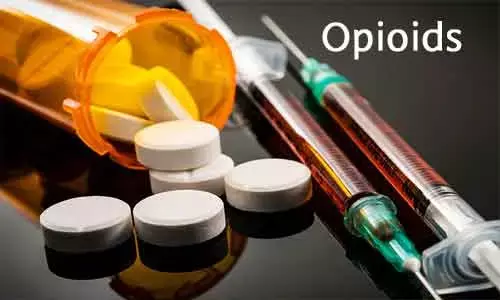- Home
- Medical news & Guidelines
- Anesthesiology
- Cardiology and CTVS
- Critical Care
- Dentistry
- Dermatology
- Diabetes and Endocrinology
- ENT
- Gastroenterology
- Medicine
- Nephrology
- Neurology
- Obstretics-Gynaecology
- Oncology
- Ophthalmology
- Orthopaedics
- Pediatrics-Neonatology
- Psychiatry
- Pulmonology
- Radiology
- Surgery
- Urology
- Laboratory Medicine
- Diet
- Nursing
- Paramedical
- Physiotherapy
- Health news
- Fact Check
- Bone Health Fact Check
- Brain Health Fact Check
- Cancer Related Fact Check
- Child Care Fact Check
- Dental and oral health fact check
- Diabetes and metabolic health fact check
- Diet and Nutrition Fact Check
- Eye and ENT Care Fact Check
- Fitness fact check
- Gut health fact check
- Heart health fact check
- Kidney health fact check
- Medical education fact check
- Men's health fact check
- Respiratory fact check
- Skin and hair care fact check
- Vaccine and Immunization fact check
- Women's health fact check
- AYUSH
- State News
- Andaman and Nicobar Islands
- Andhra Pradesh
- Arunachal Pradesh
- Assam
- Bihar
- Chandigarh
- Chattisgarh
- Dadra and Nagar Haveli
- Daman and Diu
- Delhi
- Goa
- Gujarat
- Haryana
- Himachal Pradesh
- Jammu & Kashmir
- Jharkhand
- Karnataka
- Kerala
- Ladakh
- Lakshadweep
- Madhya Pradesh
- Maharashtra
- Manipur
- Meghalaya
- Mizoram
- Nagaland
- Odisha
- Puducherry
- Punjab
- Rajasthan
- Sikkim
- Tamil Nadu
- Telangana
- Tripura
- Uttar Pradesh
- Uttrakhand
- West Bengal
- Medical Education
- Industry
Study observes steep increase in opioid-related cardiac arrest cases

The study found a significant increasing trend in opioid-associated cardiac arrest over the seven-year period.
USA: There is a steep rise in opioid-related cardiac arrests which is now equivalent to the rate of cardiac arrests from other causes, show results from a nationwide US study. The study was presented at the European Society of Cardiology (ESC) Congress 2021.
Opioid use disorder includes dependence and addiction. It affects more than two million people in the US, while opioid overdose is the leading cause of death for those aged 25 to 64 years.
This study examined the trends and outcomes of opioid-related cardiac arrest from 2012 to 2018. The US Nationwide Readmissions Database (NRD) was used to study all hospitalizations for cardiac arrest in active or chronic opioid users compared to cardiac arrests in patients not using opioids.
Of 1,410,475 cardiac arrest hospitalisations, 43,090 (3.1%) occurred in opioid users. The rate of in-hospital mortality in cardiac arrest patients with and without opioid use was 56.7% versus 61.2%, respectively. However, in an analysis adjusted for several factors including liver disease, atrial fibrillation and renal failure, there was no difference in the risk of mortality between cardiac arrest patients with or without opioid abuse (odds ratio 0.96; 95% confidence interval 0.92–1.01). Opioid users had higher rates of alcohol abuse (16.9% vs. 7.1%; p<0.05), depression (18.8% vs. 9%) and smoking (37.0% vs. 21.8%) compared to those not using opioids.
The study found a significant increasing trend in opioid-associated cardiac arrest over the seven-year period (p for trend <0.05).
Study author Ms. Senada S. Malik, a medical researcher at the University of New England, Biddeford, US said: "The rise in opioid-related cardiac arrests during the study period was significant. By 2018, opioids were related to a similar number of cardiac arrests as all other reasons put together."
She continued: "This was an observational study so we cannot conclude causality, but the findings do suggest that the opioid epidemic in the US may have contributed to an increasing number of cardiac arrests."
Ms. Malik concluded: "The rising use of opioids is having a devastating impact on the lives of many Americans. Abuse of these drugs has been linked with poor lifestyle choices including excessive alcohol intake, lack of exercise, insufficient sleep and smoking – which can lead to a downward spiral of poor decision-making. A constant need for opioids contributes to addiction, depression, poverty, unemployment and criminal/legal problems. Public health strategies including increased surveillance, research, and tracking opioid cases are desperately needed to curtail this epidemic."
Dr Kamal Kant Kohli-MBBS, DTCD- a chest specialist with more than 30 years of practice and a flair for writing clinical articles, Dr Kamal Kant Kohli joined Medical Dialogues as a Chief Editor of Medical News. Besides writing articles, as an editor, he proofreads and verifies all the medical content published on Medical Dialogues including those coming from journals, studies,medical conferences,guidelines etc. Email: drkohli@medicaldialogues.in. Contact no. 011-43720751


